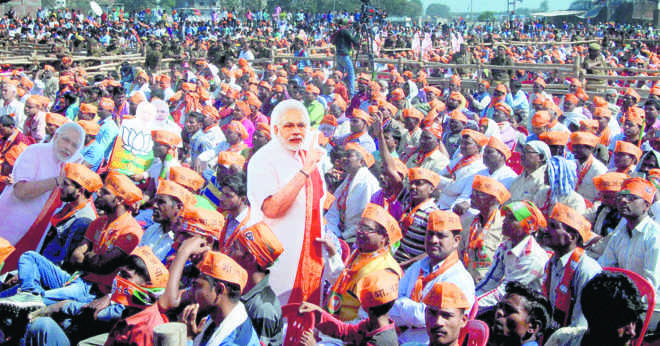
Avijit Pathak
Professor of Sociology, JNU
As the elections approach, the ruling regime wants to make us believe that there is no alternative, and hence it is wise to reject the Opposition that can only cause ‘anarchy’. Yes, the propaganda machinery that the establishment has succeeded in creating through noisy TV channels and the toxic social media manufactures this ‘truth’ — Modi with his macho-nationalism is the best choice, and the BJP with its Amit Shah and Arun Jaitley knows how to emancipate the country from all the ‘mistakes’ Nehru and his ‘dynasty’ committed.
As awakened voters and self-reflexive political subjects, we need to understand the implications of this discourse. Agreed, at a deeper level, the structure of ‘representative democracy’ and the electoral process associated with money/muscle power, as Gandhi’s vision of decentralised ‘oceanic circles’ and MN Roy’s ‘radical humanism’ with party-less participatory democracy would suggest, tend to impose some sort of passivity on us. We are compelled to believe that we can’t do much except ‘choosing’ the ‘lesser evil’; and we have no control over the quality of candidates the gigantic political parties impose on us. In a way, it generates some sort of cynicism and helplessness: everyone is corrupt, and hence it makes no sense to think of an alternative possibility! Is it that after every five years we only ‘select’ our masters?
Even though we have to acknowledge the inherent limitations of the form of democracy we have institutionalised, we should try to see some possibilities in it by exercising our agency, critical thinking and ethically nuanced political praxis. And it is in this context that we can see the dangers of the no-alternative discourse, which emanates from the cult of ‘absolute certainty’ through which all authoritarian regimes seek to define themselves. ‘We are infallible. We are true nationalists. And all those who oppose us are dangerous’ — Indira (recall the dark days of Emergency) thought like this; and today the assertive noise that the ruling regime makes manifests itself in Amit Shah’s body language filled with inflated confidence, Mr Modi’s melodramatic and aggressive speeches, Arun Jaitley’s one-dimensional blog, Ravi Shankar Prasad’s ‘legalistic’ press conference and Sambit Patra’s toxic words on TV channels known for deciding the fate of the ‘republic’ in our ‘times’. To cherish democracy, however, is to celebrate the idea of experimentation, possibilities and changes. Hence, the popularisation of the no-alternative discourse is inherently anti-democratic.
Another danger of this discourse is that it seeks to transform us as mere consumers guided by ‘brand consciousness’. Hence, politics, too, is being projected as a ‘product’, and a political personality becomes a ‘brand’. Let us understand it through an analogy. Salman Khan as a ‘brand’ promotes, say, a specific soft drink product; and his ‘magical performance’ aims at seducing the consumers. Likewise, in our times — driven by the management discourse of selling politics as a product, we see Modi as a ‘brand’ (‘energetic’, ‘efficient’, ‘dashing’ and ‘brave’) selling the politics as a ‘product’ — the gospel of hyper-masculine nationalism that gives a tough lesson to the ‘enemy’ — internal as well as external; the project of techno-development that promises bullet trains and smart cities; and the psychology of ‘Hindu pride’ aiming at reclaiming the ‘heritage’ the ‘Muslim invaders’ destroyed. With the 24×7 ‘live coverage’ of the ‘presentation of self’, the hyper-real spectacles of the ‘surgical strike’ and ‘surveys’ indicating his ‘mass appeal’, Modi as a ‘brand’ looks gorgeous. And hence, as the argument goes, there is no alternative because an ‘immature’ Rahul, a ‘pro-Muslim’ Mamata and an ‘eccentric’ Mayawati look so ‘dull’. It is like saying that Pepsi is so gorgeous that a glass of lemon water can never be an alternative! The danger is that as passive consumers of politics with ‘brand consciousness’, we lose our democratic spirit — the ability to think clearly and critically, and the creativity to nurture our own politics.
Another point needs to be understood. ‘Alternatives’ are not like fancy products that one can buy as a consumer. Our alternative political culture or our alternative mode of governance ought to emerge out of a sustained search and practice. We will make mistakes, and even enter a domain of chaos or uncertainty. Yet, history teaches us that without creative practice, temporary upheaval, and experimentation nothing innovative takes place. Gandhi made experiments with satyagraha; Ambedkar interrogated patriarchal Brahminism; and Marx dared to see beyond the exploitative character of capitalism. They were working on alternatives.
We need to see beyond what the ruling regime symbolises — the culture of narcissism leading to the mass psychology of authoritarianism, the aggression of militaristic nationalism, the reduction of religion into a mere identity-marker, the close affinity with the corporate elite causing further marginalisation of the downtrodden, and the normalisation of aggression and hatred. If we begin to think that there cannot be or should not be any alternative, we accept the rejection of our reflexivity and agency.
Well, it is possible to say that the ‘opposition’ parties — given the history of their opportunism and instrumental politics — are incapable of doing things differently. Yet, we should not stop our quest for an alternative political culture, even if we do not get a perfect result. Modi, too, emerged as an alternative to the corrupt UPA-II. So, this time why should we deprive ourselves of striving for an alternative to the present regime known for devastating consequences that measures like demonetisation, and the culture of mob lynching, cow vigilantism and war-mongering psychology have led to?
